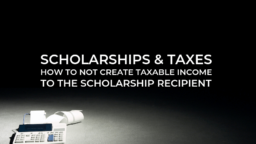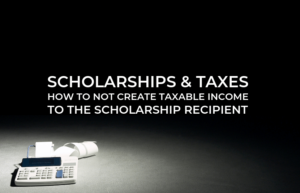Across industries, scholarships are becoming a great marketing tool, which is even more powerful today in a world where client acquisition is one Google search away.
Brands like Hyundai, Coca Cola, Staples, Dr. Pepper, JP Morgan, Hulu, and Taco Bell are using the power of brand scholarships to raise awareness of their brands and give back to the community at the same time. Many others, including law firms and accounting firms and their respective professional societies and organizations, are similarly harnessing the power of scholarships.
Scholarships are also a great recruiting tool for companies, organizations, and governmental entities.
The added benefit, of course, is that scholarship sponsors are helping students (and their families) in the process.
And students need all the help they can get today. Student debt in the United States is higher than ever, having hit $1.6 trillion in 2019. About 44 million Americans have student loan debt, with the average undergrad borrowing about $30,000.
Scholarships thus create a win-win situation for both sponsors and students.
But, to maximize the benefit to students, sponsors must ensure that their scholarships do not result in taxable income to students.

Need help with your scholarship?
The University Network is happy to help you. Just give us a call at (917) 397-2650, or schedule a time to talk to us below:
Here’s what sponsors need to know to avoid creating taxable income with their scholarship disbursements.
- What makes a scholarship tax-free?
- Are Scholarships taxable?
- When does a scholarship trigger taxable income?
- 1. Recipient is not pursuing a degree
- 2. Recipient is not attending an eligible educational institution
- 3. Scholarship amounts exceed qualified educational expenses
- 4. Scholarship amounts are designated for purposes other than qualified education expenses
- 5. The scholarship amounts represent payment for services
- Conclusion
What makes a scholarship tax-free?
The IRS defines scholarship as “generally an amount paid or allowed to, or for the benefit of, a student (whether an undergraduate or a graduate) at an educational institution to aid in the pursuit of his or her studies.”
Are Scholarships taxable?
The short answer is no, but to be tax-free, a scholarship must meet the following conditions:
- The recipient must be a candidate for a degree at an eligible educational institution;
- The recipient must use the scholarship to pay qualified education expenses;
- The scholarship amounts must not exceed qualified education expenses;
- The scholarship is not designated or earmarked for purposes other than qualified education expenses — for example, room and board — and doesn’t require that the recipient use the amounts for non-qualified education expenses only; and
- The scholarship amounts are not intended as payment for teaching, research or other services.
Now, let’s walk through the key definitions of the IRS conditions.
First, to be considered a candidate for a degree, the recipient must be pursuing an undergraduate or graduate degree at a college, university or other accredited educational institution.
Second, to qualify as an eligible educational institution for tax purposes, the IRS requires that:
- The primary function of a college, university or other educational institution be the presentation of formal instruction;
- The college, university or other educational institution normally maintains a regular faculty and curriculum; and
- The college, university or other educational institution normally has a regularly enrolled body of students in attendance at the place where it carries on its educational activities.
Third, to fall under qualified education expenses for scholarship purposes, the IRS considers only these expenses:
- Tuition and fees required for the recipient to enroll at or attend an eligible educational institution; and
- Expenses required of all students for courses taken at an eligible education institution — for example, fees, books, supplies, and equipment. None of these items can be optional.
Qualified education expenses do NOT include these incidental expenses:
- Room and board;
- Travel;
- Research;
- Clerical assistance; or
- Optional equipment and other expenses.
Scholarships that meet these conditions are tax-free even if the recipient is studying abroad.
Note: A fellowship (amount given to aid in the pursuit of study or research) would have to meet the same conditions as a scholarship to be tax-free.
When does a scholarship trigger taxable income?
A scholarship would result in taxable income to scholarship recipients in these situations.
1. Recipient is not pursuing a degree
This is an obvious point given the IRS requirement that a recipient be a candidate for an undergraduate or higher degree. So, if the recipient is taking non-degree classes or is considered ineligible for a degree, the entire scholarship amount would be taxable.
2. Recipient is not attending an eligible educational institution
Again, this is an obvious point given the IRS mandate that a recipient attend an eligible educational institution. This requirement is easy enough to verify — just check the school list compiled by the U.S. Department of Education. You can also check with the school itself.
3. Scholarship amounts exceed qualified educational expenses
As mentioned above, scholarship amounts must be used only for qualified educational expenses (defined above) to be exempt from taxes. Consequently, if the scholarship amounts exceed such qualified educational expenses, the excess amount would be taxable.
For example, if the scholarship is for $5,000 and the qualified educational expenses are only $3,000, then $2,000 would be considered taxable by the IRS.
4. Scholarship amounts are designated for purposes other than qualified education expenses
Any scholarship amount that is designated or earmarked for purposes that are not considered qualified education expenses (such as room and board) would result in taxable income to the recipient. This is true even if a portion of the scholarship amount is used for qualified education expenses.
For example, an athletic scholarship, which often covers room and board as well as tuition and required fees, would be treated as tax-free only to the extent that the scholarship amounts are used for tuition and required fees (qualified education expenses) and not designated for non-qualified education expenses.
- Scenario 1 — The athletic scholarship is for $30,000, half of which is designated for tuition and required fees (qualified education expenses) and the other half for room and board (non-qualified education expenses). The student uses the funds exactly as designated. The result — $15,000 would be tax-free and $15,000 would be taxable income.
- Scenario 2 — The athletic scholarship is for $30,000, half of which is designated for tuition and required fees (qualified education expenses) and the other half for room and board (non-qualified education expenses). The student uses $17,000 on tuition and required fees and $13,000 on room and board. The result — $15,000 would be tax-free and $15,000 would be taxable income. The result is the same as Scenario 1 even though the student spends $2,000 more on qualified education expenses. This is because the sponsor designated $15,000 for non-qualified education expenses.
5. The scholarship amounts represent payment for services
Any amount that is intended as payment for teaching, research, or other services that are required as a condition for the scholarship is taxable. (This is true even if all the candidates for a degree are required to perform the services to receive the degree.)
However, the amount that would have been taxable because it represents payment for services would be tax-free if it is received under:
- The National Health Service Corps Scholarship Program;
- The Armed Forces Health Professions Scholarship and Financial Assistance Program; or
- A comprehensive student work-learning-service program operated by a “work-college.”
For example, if the scholarship is for $5,000, but the recipient is required to provide research services as a condition to get half of it, $2,500 would be taxable. However, the whole amount would be tax-free if it falls under one of the three exceptions.
As a practical matter, Form W-2 for reporting wages should also be issued for the taxable portion.
Conclusion
To maximize benefit and to avoid any amount being deemed taxable, it’s best that the scholarship amount is paid directly to the scholarship recipient’s school and have it earmarked for qualified education expenses.

Need help with your scholarship?
The University Network is happy to help you. Just give us a call at (917) 397-2650, or schedule a time to talk to us below:
Resources















